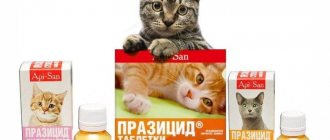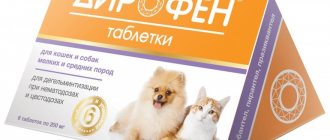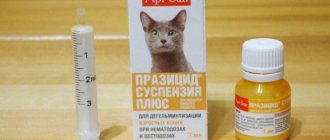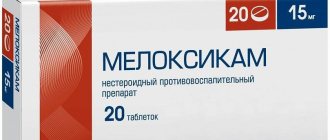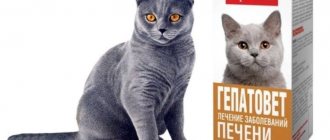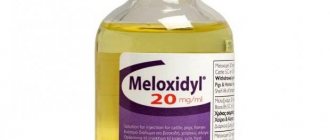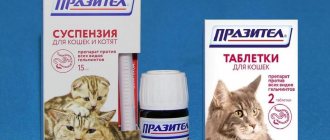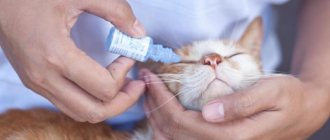How does worm infection occur?
The main sources of worm infection in domestic animals are:
- a female that was not dewormed before mating/mating
- feces of other animals
- homemade or raw food
- street shoes
- fleas, mice, birds, etc.
There are many sources of worm infection even in animals that do not walk outside, so worms in dogs are no more common than in cats living at home. It is important to remember that the main sources of infection of pets are the owners themselves.
Prevention of worms
Many owners wonder whether my pet needs to be dewormed and how to deworm him correctly and often.
The age at which it is best to start preventing worms in kittens and puppies is 3 weeks. Then, when visualizing helminths in feces, repeat after 14 days. The next worming is 6 months after changing teeth and then every year or 10-14 days before vaccination.
Prevention of worms in cats and dogs is carried out as follows:
- worms in a domestic cat that eats dry and wet food are chased 2 times a year, in autumn and spring; if the cat walks outside and/or eats homemade or raw food, then it needs to be dewormed 4 times a year (every three months)
- prevention of worms in dogs is usually carried out 4 times a year (every three months) due to regular walks outside and/or eating homemade or raw food. If your dog sits at home and eats dry and wet food, then it needs to be wormed twice a year, in autumn and spring.
It should be remembered that if you have several pets, and one of them has become infected with worms, then for prevention purposes it is necessary to deworm all pets.
Broad-spectrum antiparasitic drugs are best suited for preventive deworming, as they fight several types of worms at the same time.
Types and effectiveness of anti-worm suspension
For unknown reasons, anti-worm suspensions are considered “weak”. There is an opinion that the suspension must be reused, and it is only suitable for kittens.
In fact the situation is as follows:
- If you treat your cat as expected, quarterly, then you do not need to re-give the suspension.
- If you have not wormed your pet for six months or more, picked up a kitten on the street, or become the owner of an adult, unfamiliar cat, the suspension must be given at least twice, with a break of 10–12 days.
If we compare the suspension with alternative anthelmintic drugs, in terms of “power”, it is not inferior to tablets. The question is different: any drug will turn out to be weak if its spectrum of action is chosen incorrectly. For example, if a cat has parasites in its muscles, an intestinal worm suspension will not help it.
Note! If you compare popular suspensions, you find that most of them are similar.
Suspension Prazitel
Prazitel is the most common suspension against worms in cats and kittens. The drug has received a good reputation for its comparative harmlessness. Numerous positive reviews from owners are encouraging, especially considering that many use Parasitel to treat kittens. Main active ingredients: praziquantel and pyrantel pamoate.
The drug acts on parasites in the following way. The active ingredients slow down the fermentation of beneficial substances in parasites, which leads to muscle weakness. In a short period during which the parasite cannot move and defend itself, paralysis occurs. Next, the parasites die or are eliminated from the gastrointestinal tract.
Note! Pyrantel is partially absorbed from the intestines into the pet’s blood, but is completely eliminated from the body within 24 hours.
The spectrum of action of the drug allows you to relieve your pet from:
- Toxocariasis and toxascariasis.
- Tenidose.
- Dipylidia.
- Trichocephalosis.
- Uncinarium.
- Echinococcosis.
- Hookworm.
- Diphyllobothriasis.
- Opisthorchiasis.
- Mesocestoidosis.
The drug is available in 15 ml bottles. In this case, the dosage is calculated from the ratio of 1 ml of the drug per 1 kg. body weight. If treatment is carried out prophylactically, no additional measures will be required.
If you picked up an animal from the street or have not treated it for parasites for more than six months, you must:
- Consult your veterinarian about the need to use laxatives.
- Re-treat after 10 days.
- Carefully examine the stool 2-3 days after re-treatment. If there are traces of helminths, consult a veterinarian. The doctor will either prescribe re-treatment or change the drug.
Note! Prazitel can be used to treat pregnant cats in the second trimester and kittens over 3 weeks of age.
Before use, the bottle with the drug must be shaken thoroughly. The suspension must be homogeneous. If the drug separates or a sediment quickly appears, it should not be used (it may be spoiled).
Using a dispenser, the suspension is drawn from a bottle and applied to the root of the cat's tongue. If you don't have a dispenser, you can use a syringe.
If the dosage and doctor's recommendations are followed, side effects are extremely rare. In case of individual intolerance, increased salivation, vomiting with foam, and mild apathy may be observed. All negative effects usually disappear without intervention within a few minutes.
Prazicide plus
Prazicide Plus is a relatively safe anti-worm suspension with a wide spectrum of action. The drug is available in bottles of 5 and 7 ml. Main active ingredients: praziquantel and pyrantel pamoate. As you can see, Parasiticide and Prazitel are complete analogues.
The spectrum of action of the drug will help rid your pet of the following types of infestation:
- Toxocariasis and toxascariasis.
- Diphyllobothriasis.
- Trichocephalosis.
- Mesocestoidosis.
- Tenidosis.
- Uncinariasis.
- Echinococcosis.
- Hookworm.
- Dipylidiasis.
Prazicide is a drug of combined action that leads to paralysis and partial death of worms. The suspension has a sweet taste and non-specific odor. Each bottle is equipped with a dispenser syringe. For convenience, the drug is available in dosages for kittens and adult animals.
The drug is safely used to treat kittens older than 4 weeks and adult, healthy animals. Treatment must be carried out under the supervision of a doctor if your pet:
- Weakened or recently suffered from illness.
- Bears kittens.
- Has allergies or suffers from individual intolerance to medications.
- Over 12 years old.
- Suffering from urolithiasis.
Important! Prazicide is not used to treat cats in the first period of pregnancy.
Shake the bottle thoroughly for several minutes before use. The suspension should become thick and homogeneous. If you observe separation of the drug or precipitation, it is strictly not recommended to use it.
The suspension is given in the morning, on an empty stomach. After 1–1.5 hours, the pet can be fed. During preventive treatment, the use of laxatives is not required. If the animal was picked up on the street or has not been treated for worms for a long time, it is necessary to ensure that a complete bowel movement occurs.
In case of an overdose of the drug, no acute reactions are observed. Possible nausea. slight indigestion, drowsiness, short-term refusal to eat. In rare cases, due to intolerance to the components of the drug, the cat may experience increased secretion of foamy saliva. If a cat has allergies, skin redness, itching, and irritation of the mucous membranes may occur.
Dirofen
Dirofen is a broad-spectrum anti-helminth suspension. For cats, the drug is available in a single dosage, in an individual bottle. Main active ingredients: pyrantel pamoate and praziquantel. Externally, the suspension should be homogeneous, yellowish, without sediment or signs of separation.
The active substances stop the nervous activity of the worms, which leads to paralysis and death. Dead parasites are excreted naturally - in feces. If the pet has not received worm prevention for more than six months, the suspension is repeated after 10–12 days.
The drug has a wide spectrum of action and helps rid your pet of round and tapeworms, regardless of the stage of development:
- Toxocariasis and toxascariasis.
- Uncinariasis.
- Tenidosis.
- Trichocephalosis.
- Dipylidiasis.
- Diphyllobothriasis.
- Hookworm.
- Echinococcosis.
- Mesocestoidosis.
Note! The maximum therapeutic effect occurs 2.5–3 hours after administration of the drug.
The drug is used for therapeutic and prophylactic treatment of adult animals and kittens older than 4 weeks. You should exercise caution and consult a doctor before treatment:
- Animals with unknown history.
- Cats who have had the disease.
- Weakened, emaciated and dehydrated animals.
- Kittens under 4 weeks of age and with critical infestation.
- Pregnant (in the first trimester) and lactating cats.
Important! The drug is available in two forms: “Dirofen 20” and “Dirofen 60”. Only Dirofen 20 is suitable for treating cats; Dirofen 60 is intended for the prevention of worms in dogs!
The prophylactic dose of Dirofen for cats is 1 milliliter per 1 kg. body weight. The drug is given in the morning, on an empty stomach. If administration to the root of the tongue is not possible, the suspension can be mixed with a small amount of food.
Anti-worm suspension Dironet
Dironet is a broad-spectrum suspension against internal parasites. Main active ingredients: pyrantel pamoate, praziquantel, ivermectin. Some animals have individual sensitivity to ivermectin, so it is better to consult a doctor before using the drug.
Note! Dironet is available in the form of a yellowish, water-based suspension. A slight separation of the drug is acceptable if it disappears with shaking.
After using the drug, the active substances are quickly absorbed into the bloodstream, making it possible to eliminate round and tapeworms at any stage of development.
According to the manufacturers, Dironet eliminates:
- Toxocariasis and toxascariasis.
- Dipylidiasis.
- Hookworm.
- Taeniasis.
- Trichocephalosis.
- Diphyllobothriasis
- Uncinariasis.
- Echinococcosis.
- Mesocestoidosis.
Ivermectin is almost completely absorbed into the bloodstream and excreted in the urine. The maximum therapeutic effect occurs 4 hours after administration. All active ingredients disrupt the metabolism of parasites, and ivermectin promotes more abundant penetration of chloe ions through intercellular membranes. Affected worms lose mobility and quickly die.
The dosage for the prevention of worms in cats is the same: 1 ml per 1 kg. body weight. In case of severe infestation, the treatment is repeated after 10 days. Before use, shake the vial with the suspension for 1–2 minutes. Using a dispenser, the exact amount of the drug is measured. For maximum effectiveness, the suspension is administered to the cat orally, on the root of the tongue. If you cannot drink the suspension, it can be mixed with a small amount of food, for example, cottage cheese.
Note! In rare cases, due to individual intolerance to the drug, the cat may experience foaming of saliva or increased drooling.
Febtal combo
Febtal combo is a combined anthelmintic drug for the prevention of parasites in cats and kittens. Main active ingredients: praziquantel and albendazole. Upon penetration into the gastrointestinal tract and bloodstream, the active substances disrupt the nervous activity of the worms, which leads to paralysis and rapid death.
Febtal combo is effective against the following invasions and their combinations:
- Hookworm.
- Diphyllobothriasis.
- Dipylidiasis.
- Toxocariasis and toxascariasis.
- Trichocephalosis.
- Tenidosis.
- Mesocestoidosis.
- Cestodosis.
- Uncinariasis.
- Echinococcosis.
Febtal combo is not recommended for use in cases of individual intolerance to the active ingredients, in cats bearing or nursing offspring, or in kittens under 1 month of age.
Febtal combo dosage is calculated by weight: 1 ml per 1 kg of body weight. drug. Before taking the suspension, the bottle must be thoroughly shaken for at least two minutes. No preparation is required to take the drug. A precisely measured dose is given on an empty stomach before morning feeding.
Treatment of worms
The goals of therapeutic deworming are: - removal of sexually mature individuals and larvae of helminths (worms) - restoration of normal microflora of the gastrointestinal tract - maximum reduction of the risks of developing complications from helminth toxins upon their death.
Therapeutic deworming is carried out at least 2 times with an interval of 10-14 days, since the drugs do not act on helminth larvae and several dewormings are due to the development cycles of parasites. At the same time, in case of severe intoxication - vomiting, refusal to feed, failure of the pelvic limbs - infusion therapy is necessary, since the death of the pet is possible.
It should be noted that with proper and timely treatment, worms in cats, like in dogs, can be eliminated quite easily.
Preventive measures
As you know, any disease is easier to prevent than to treat. Helminthiasis is no exception to the rule, especially since it can be avoided by adhering to the following rules:
- Do not feed your animal raw meat, fish or offal.
- Treat regularly for fleas
- Every 3 months, for prevention, give tablets against worms .
- Eliminate contact between the cat and its street counterparts
- Carry out regular wet cleaning of the apartment using disinfectants
- Treat your pet's care items and sleeping place for parasites.
If you adhere to these requirements, you can easily avoid infecting your cat with helminths. In addition, you will protect yourself and all family members in this way. After all, many types of worms that parasitize the body of domestic animals are dangerous for humans and can be transmitted to people through contact with cats or caring for them.
The only thing that should be taken into account is that medications can only be given for prophylactic purposes to healthy animals and it is better after consultation with a veterinarian. This will help avoid the development of complications when taking deworming tablets.
Is it possible to give anti-worm medications to pregnant and lactating animals?
It is not recommended to deworm pregnant and lactating animals, since most antiparasitic drugs can have a negative effect on the development of the young.
Prevention of worms in females should be carried out 10-12 days before the expected mating/mating. Cubs are wormed 21 days (3 weeks) after birth.
If a pregnant animal has become infected with worms, then the issue of deworming it must be discussed with a veterinarian and the degree of possible risk must be assessed.
Rules and scheme of deworming
In order to do it correctly, you need to remember some aspects:
- From early childhood, the dog must be given anthelmintics. The first time a deworming course is needed is when the dog is 3 months old. At the same time, it is advisable to do it for the puppy’s mother as well.
- If there are several animals in the house, deworming is carried out for all pets.
- If you want to take your dog with you on trips abroad, you must use foreign funds, otherwise you will be denied entry into another country. You also need to have a veterinary passport and have it certified with the stamp of a state veterinary clinic.
- The medications are different for each animal, so it is advisable to purchase medications intended for dogs. There are also separate products for puppies.
- If you use the drug in the form of a suspension, be sure to shake the bottle before use.
Now you can consider the deworming scheme itself:
- The first administration of anthelmintic drugs must be carried out directly by the carrier himself. It is carried out on the 21st day of the pet’s life.
- After 10 days, repeated deworming is carried out (31 days of life).
- When the puppy turns 50 days old, another dose of anthelmintic drugs is given.
- In the eighth week (second month) of life, vaccination is carried out, then a stamp must be obtained in the veterinary passport, quarantine is maintained for 14 days.
- Repeated deworming is carried out after 10 weeks from the date of birth of the dog. That is, immediately after a two-week quarantine.
- In the third month of the pet’s life, a rabies vaccination is carried out, after which a stamp is again required in the veterinary passport, quarantine is again maintained for 14 days
- From this moment (3.5 months from birth) until the age of one, deworming is carried out every 3 months. That is, for 6, 9 and 11 months you need to give anthelmintics. At this time, you can go for a walk outside.
- As soon as the pet is one year old, it needs a new vaccination and a stamp in the veterinary passport.
- Then vaccination is carried out annually, and deworming - 2-3 times a year.
Why get rid of worms before vaccination?
Vaccination is one of the most important conditions for developing your pet’s immunity. And if the worms are not removed from the animal’s body before vaccination, then immunity may either not be formed at all or not fully formed, which will lead to a new infection.
In addition, vaccination entails the death of worms, which can lead to intoxication of the animal’s body and its subsequent death.
Therefore, the animal simply needs to be dewormed before vaccination. The deworming procedure should be carried out 7-10 days before vaccination.
Pills
Among anthelmintics in the form of tablets, the following drugs are popular:
- Milbemax.
A combination product based on praziquantel and milbemycin oxime is considered one of the best anthelmintic drugs for cats. Available in 2 versions - for large cats, for kittens and small cats. Well suited for both treatment and prevention. Can be used for animals whose weight has reached 0.5 kg. The cost of a package of 2 tablets ranges from 300 to 480 rubles, depending on the purpose. Read more: Melbimax for cats - Drontal.
The German company Bayer has developed a medicine against worms based on two active ingredients - praziquantel and pyrenthal embonate. Their combined action ensures high efficiency. The product can be used to destroy round and tapeworms, as well as prevent their occurrence. The main advantage of the medicine is that it helps remove parasites from the animal’s body. There is no need to give a laxative. The dosage is calculated simply - 1 tablet per 4 kg of weight. A package of two Drontal tablets costs about 300 rubles. Read more: Drontal for cats
- Vacation.
Complements the list of highly effective and safe imported anti-worm products. The combination of praziquantel and fenbendazole works against nematodes, cestodes and trematodes. The usual intake of one tablet is enough to forget about internal parasites. Also suitable for prevention. A pack of 12 or 24 tablets is quite expensive. In many pharmacies, tablets are sold individually - 60-70 rubles. per piece Usually one tablet is enough for one anthelmintic, since it is designed for 10 kg of weight. Read more: Vacation for cats - Febtal.
Among domestic anthelmintics, Febtal is the most popular. It was developed by Russian. The fenbendazole-based medicine has a pleasant aroma for cats, so they often eat it without coercion. Compared to imported products, Febtal is inexpensive - a pack of 6 tablets will cost 125-140 rubles.
Some manufacturers add various flavors to the tablets so that pets eat them without being forced. Sometimes owners manage to hide the medicine in the food, but in most cases they have to put it on the root of the tongue.
Note! Anthelmintics should be given in the morning, preferably half an hour before feeding.
Is deworming dangerous?
The use of antiparasitic drugs in doses specified by the manufacturer is safe for the health of your pet.
Rules for successful and safe deworming:
- it is necessary to strictly follow the instructions for the antiparasitic drug (compliance with the dosage, frequency and regimen)
- you cannot drive worms from exhausted, sick and recently operated animals, since the animal’s body is still weakened, and the effects of antiparasitic drugs can lead to serious consequences for the pet’s health.
